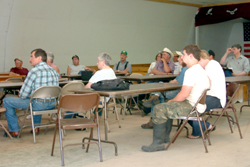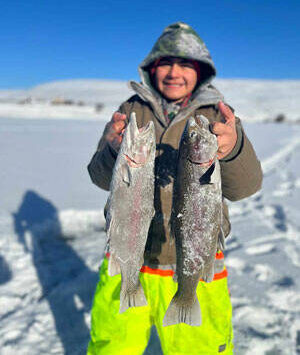
Several area farmers, many of them from the Okanogan Highlands, attended the meeting on canola and camelina production held at the Chesaw Rodeo Hall on Wednesday, July 14. They learned that they could grow about 1000 pounds of camelina per dry land acre a
CHESAW – Based on the momentum and a great desire to see local economies change for the better, a growers’ meeting took place on July 14 at the Chesaw Rodeo Hall regarding the process of growing canola and camelina as a rotational crop.
Tim King of Carbon Technology Transfer Center, wants to bring a canola press to Oroville to process oil from surplus canola crops currently grown in Canada. He also wants to gauge the interest in growing canola and camelina locally. He and John Sheldon, representing the Great Plains Camelina Group, spoke to the farmers about the potential for growing canola and camelina as a sustainable cash crop and improving crop yield for other crops with the added benefit of enriching the farmer’s soil. King and Sheldon discussed the ins and outs of growing the canola and camelina.
Up to 20 percent canola oil can be mixed with diesel fuel to make the fuel more environmentally friendly. The oil’s well-known lubricating properties also extend engine life and can be used as lubricant in many other applications. Camelina oil is used in products such as jet fuel. According to the Great Plains Camelina Group website (www.camelinacompany.com) Camelina oil and domestic coal will soon be blended to create clean biojet fuel using coal-biomass-to-liquid technology (CBTL), thanks to an agreement between Accelergy Corporation and Great Plains Oil and Exploration – The Camelina Company.
“The aviation industry is demonstrating its desire for biojet fuel with the certification of biofuels on regular commercial flights expected in 2012, the Air Force’s target to use 50 percent domestic jet fuel by 2016 and the European Union’s mandate that transportation fuels consist of 10 percent biofuel by 2020, the industry is demonstrating its increasing readiness for biojet,” according to the Web site.
Like diesel mixed with canola oil, biojet would produce less harmful emissions and would help the country rely less on imported oil.
King and Sheldon said the farmers could make about 15 to 16 cents per pound growing canola and camelina. In the worst-case scenario, a farmer could raise about 1000 pounds per acre on dry land. On land that was not irrigated, but was moist, the amount grown goes up to 1500 pounds of camelina and 2000 pounds canola per acre. On irrigated land the farmers could expect to see crop yields of between 4000 and 6000 pounds of canola per acre.
King said that the crushed canola plant will yield 45 percent oil and that the camelina yields 35 percent. He envisions multiple seed crushing plants around the region to produce the oil and that there is the possibility of producing bio-diesel in the area right now with a crushing plant. The oil from the canola plant can also be used to produce high-grade gear and machine oil. According to King, canola recently became Canada’s most produced crop at 15 million acres.
Growing canola is also good for the soil. Farmers who return to wheat after growing canola can see increases in yield of 15 to 20 percent. The crop is a natural soil fumigant and a hard pan destroyer with a deep tap root that breaks up the soil, according to King.
By mixing the meal left over after pressing with hay – one part meal to four parts canola – a high protein cattle feed is produced that sells for between $150 and $160 a ton, according to King.
The meeting was attended by several area farmers and other interested parties, including
Karl and Ulrich Semrau, Mike B. Nelson, Phillip Dart, Ann Marie Close, Brian Nelson
Ann Owen, Eric DeCoup, Pat Gauthier, Bob Miller, Bob Jewett, Bill Myers, Steve and Carol Leslie, Darrel and Jim Bunch, Joe Gubser, Harry Leslie, Dotti Skelton and Monte Alexander.
Arnie Marchand, LM Energy LLC kicked off the meeting and made introductions. Okanogan County Commissioner Candidate Jim Detro and his wife Patty were also there. Candidate Detro, who was an invited guest speaker, spoke on behalf of his campaign and his support of the Sustainable Oroville project.
After the presentation, King and Sheldon held a question and answer session, some of which follows:
Q: What happens if we want the meal — can we buy it back from you?
A: We’ll sell you the meal back for less than what we paid you for the seed if you want back. It is more efficient to keep it in the area if you or other farmers want to create dairies here, poultry farms etc.
Q: What would you pay for the Camelina – will it be a guaranteed price?
Last year’s price was 16 cents per lb for Camelina. That isn’t a quote for what Great Plains or Tim will pay for this season. Yes, that was the guaranteed price.
Q: Can Canola and Camelina be grown without herbicides and pesticides?
A: Yes to both. Camelina can grow at 35 degrees and establish itself when most other plants haven’t come out of dormancy. Allowing for the natural suppression of weeds without the use of chemicals. Canola requires a slightly warmer temperature but still gets an early start on.
More information on Tim King’s plans can be found on www.sustainableoroville.com.
(This article was written with notes provided by Pam Leslie, LM Energy, LLC).







